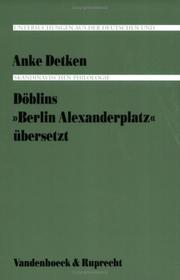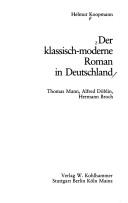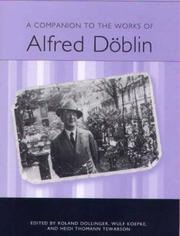| Listing 1 - 5 of 5 |
Sort by
|

ISBN: 3525205732 9783525205730 Year: 1997 Publisher: Göttingen: Vandenhoeck und Ruprecht,
Abstract | Keywords | Export | Availability | Bookmark
 Loading...
Loading...Choose an application
- Reference Manager
- EndNote
- RefWorks (Direct export to RefWorks)
Book
ISBN: 9783956790041 3956790049 Year: 2015 Publisher: Berlin : Sternberg Press,
Abstract | Keywords | Export | Availability | Bookmark
 Loading...
Loading...Choose an application
- Reference Manager
- EndNote
- RefWorks (Direct export to RefWorks)
"Rainer Werner Fassbinder's fourteen-part Berlin Alexanderplatz, broadcast on German television in 1980, is a pivotal work in the artist's oeuvre. In this work, along with others from the same period, Fassbinder established a Jewish-German mirror rotating on the axis of the Holocaust. In Hystericizing Germany, Manfred Hermes provides an excursive analysis of the potential of narration within the paradoxes of cinematic representation, with Fassbinder's miniseries forming both beginning and end point."--Publisher's website, http://www.sternberg-press.com.
Fassbinder, Rainer Werner, --- Télévision --- Narration --- Analyse de l'image --- Cinéma --- Cinéma et idéologie --- Fassbinder, Rainer Werner --- Berlin Alexanderplatz (Television program)
Book
ISBN: 9781640140059 9781787441040 1640140050 1787441040 Year: 2017 Publisher: Rochester, N.Y. : Camden House, 2017
Abstract | Keywords | Export | Availability | Bookmark
 Loading...
Loading...Choose an application
- Reference Manager
- EndNote
- RefWorks (Direct export to RefWorks)
Alfred Döblin's novel Berlin Alexanderplatz and its film adaptations by Jutzi and Fassbinder are canonical works of literature and cinema, and yet there is no monograph that treats all three. This omission is even more striking since Döblin's novel is seen as the most famous example of literary appropriation of film montage aesthetics. Mario Slugan addresses this glaring oversight by considering montage in experiential, historic, stylistic, and narratological terms. Starting from the novel argument that montage is best understood as a perceptual experience rather than as a juxtaposition of meaning, Slugan proposes that it was the perceived experiential similarity with Dada photomontage and Soviet montage films rather than any juxtaposition of meaning that made contemporary critics identify Berlin Alexanderplatz as the first novel to appropriate film montage. It was the perceived relative absence of montage in the filmings of the novel, moreover, that significantly contributed to their contemporary dismissals as failed adaptations. Slugan argues that both Jutzi's and Fassbinder's films nevertheless present innovative types of both visual and sound montage. These, in turn, allow for the articulation of medium-specific traits of film montage as opposed to those of literary montage, including the organization of time and space, the use of ready-made material, and the relation of montage to the figure of the narrator. Mario Slugan is a Postdoctoral Associate Fellow at the Department of Film and Television Studies and the Department of German Studies, University of Warwick.
Montage --- Döblin, Alfred, --- Jutzi, Piel --- Fassbinder, Rainer Werner, --- Criticism and interpretation. --- Criticism and interpretation --- Montage. --- Döblin, Alfred, --- Film adapatations. --- Berlin Alexanderplatz (Motion picture) --- Berlin Alexanderplatz (Television program) --- Berlin Alexanderplatz (Motion picture). --- Berlin Alexanderplatz (Television program). --- Döblin, Alfred, - 1878-1957 --- Jutzi, Piel - Criticism and interpretation --- Fassbinder, Rainer Werner, - 1945-1982 - Criticism and interpretation --- Arts --- Fassbinder, R. W. --- Jutzi, Phil --- Döblin, Alfred --- Deblin, A., --- Poot, Linke, --- Doeblin, Alfred, --- דבלין, אלפרד, --- דעבלין, אלפרעד --- Fassbinder, Rainer Werner, - 1945-1982 --- aesthetics. --- art history. --- cinematography. --- fiction. --- film and media studies. --- history. --- montage. --- movies. --- novel. --- photography. --- scholarship. --- study.

ISBN: 317005628X 9783170056282 Year: 1983 Volume: 113 Publisher: Stuttgart
Abstract | Keywords | Export | Availability | Bookmark
 Loading...
Loading...Choose an application
- Reference Manager
- EndNote
- RefWorks (Direct export to RefWorks)
Fiction --- Döblin, Alfred --- Mann, Thomas --- Broch, Hermann --- German fiction --- History and criticism --- Mann, Thomas, --- Döblin, Alfred, --- Broch, Hermann, --- History and criticism. --- German fiction - 20th century - History and criticism --- Mann, Thomas, - 1875-1955 - Zauberberg --- Döblin, Alfred, - 1878-1957 - Berlin Alexanderplatz --- Broch, Hermann, - 1886-1951 - Schlafwandler

ISBN: 9781571131249 1571131248 9781571136169 1571134603 9786611801038 1281801038 1571136169 Year: 2004 Publisher: Rochester, N.Y. Camden House
Abstract | Keywords | Export | Availability | Bookmark
 Loading...
Loading...Choose an application
- Reference Manager
- EndNote
- RefWorks (Direct export to RefWorks)
Alfred Döblin (1878-1957) was one of the great German-Jewish writers of the 20th century, a major figure in the German avant-garde before the First World War and a leading intellectual during the Weimar Republic. Döblin greatly influenced the history of the German novel: his best-known work, the best-selling 1929 novel Berlin Alexanderplatz, has frequently been compared in its use of internal monologue and literary montage to James Joyce's Ulysses and John Dos Passos's Manhattan Transfer . Döblin's oeuvre is by no means limited to novels, but in this genre, he offered a surprising variety of narrative techniques, themes, structures, and outlooks. Döblin's impact on German writers after the Second World War was considerable: Günter Grass, for example, acknowledged him as "my teacher." And yet, while Alexanderplatz continues to fascinate the reading public, it has overshadowed the rest of Döblin's immense oeuvre. This volume of carefully focused essays seeks to do justice to such important texts as Döblin's early stories, his numerous other novels, his political, philosophical, medical, autobiographical, and religious essays, his experimental plays, and his writings on the new media of cinema and radio.Contributors: Heidi Thomann Tewarson, David Dollenmayer, Neil H. Donahue, Roland Dollinger, Veronika Fuechtner, Gabriele Sander, Erich Kleinschmidt, Wulf Koepke, Helmut F. Pfanner, Helmuth Kiesel, Klaus Müller-Salget, Christoph Bartscherer, Wolfgang Düsing.Roland Dollinger is associate professor of German at Sarah Lawrence College; Wulf Koepke is professor emeritus of German at Texas A&M University; Heidi Thomann Tewarson is professor of German at Oberlin College.
Döblin, Alfred --- Döblin, Alfred, --- Criticism and interpretation. --- Döblin, Alfred --- Deblin, A., --- Poot, Linke, --- Doeblin, Alfred, --- דבלין, אלפרד, --- דעבלין, אלפרעד --- LITERARY CRITICISM / European / German. --- 20th Century Literature. --- Alfred Döblin. --- Berlin Alexanderplatz. --- German-Jewish Writer. --- Internal Monologue. --- Literary Montage. --- Modernist Novelist. --- Social Commentary. --- Urban Life. --- Weimar Republic. --- Doblin, Alfred,
| Listing 1 - 5 of 5 |
Sort by
|

 Search
Search Feedback
Feedback About UniCat
About UniCat  Help
Help News
News